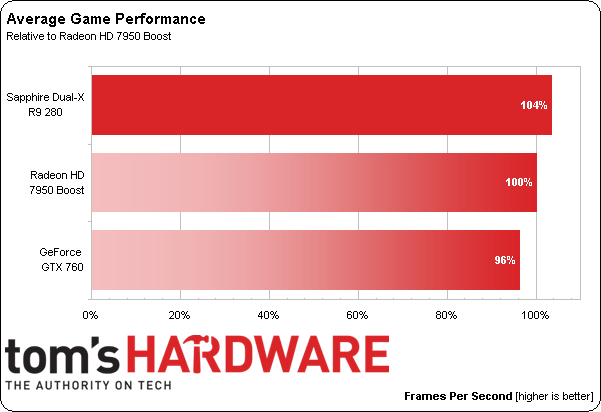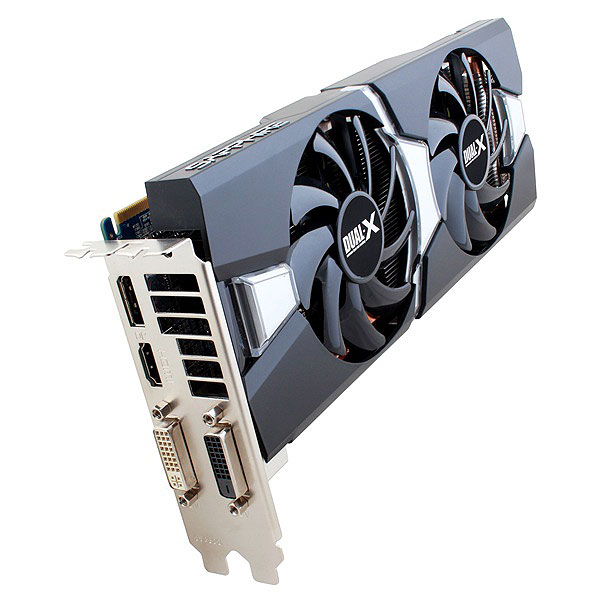Sapphire's Dual-X R9 280 OC Graphics Card Review
We take a look at the value proposition offered by Sapphire's Dual-X R9 280 and consider it's performance compared to its competitor, the GeForce GTX 760, and its predecessor, the Radeon HD 7950 Boost.
Sapphire's Dual-X R9 280: A Solid Option At A Good Price
With the individual benchmarks behind us, let's consider average performance across those tests. The following chart is based on our DirectX-based results, and does not take Mantle into account.
Its no surprise that the Dual-X cooler allows the R9 280 to stay at its slightly-overclocked state longer than a reference Radeon HD 7950 Boost. On average, that gives Sapphire's card more of a lead against the GeForce GTX 760 in the benchmarks we ran. Other games might show Nvidia's card in a more favorable light, but we do think that these cards are generally on par. Sapphire's Dual-X R9 280 tends to take a slight lead in most titles. In the real world, however, that'd be difficult to notice.
The decision between AMD's Radeon R9 280 and Nvidia's GeForce GTX 760 comes down to features and price, as it has since these two cards were introduced. Folks will favor the Radeon when Mantle, Raptr, or cryptocurrency mining are factors, and the GeForce if CUDA, PhysX, 3D Vision, or GeForce Experience (and its related features) come into play. But it's such a close race that I don't think an enthusiast can go wrong in the $250 range for either a Radeon R9 280X or GeForce GTX 760 with a nice aftermarket cooler.
Having said that, a quick check on Newegg shows that Sapphihre's Dual-X R9 280 is currently on sale for $220 (and $200 with rebate), making it hard to find fault with this graphics card from a value standpoint. It was more than capable of running every game we threw at it, even using demanding detail settings and high resolutions, with averageframe rates that never dropped below 30.
True, we're on the cusp of the introduction of AMD's Radeon R9 285. But performance should be competitive with (if not slightly superior to) the Radeon R9 280, judging from the specifications. Rumors abound that Nvidia might have new products on the horizon too, and they might change our outlook in the near future. Still, none of these potential changes in the market take too much away from the value prospect of Sapphire's Dual-X R9 280 at its current price.
Get Tom's Hardware's best news and in-depth reviews, straight to your inbox.
Current page: Sapphire's Dual-X R9 280: A Solid Option At A Good Price
Prev Page Power, Temperature, And Frequency BenchmarksDon Woligroski was a former senior hardware editor for Tom's Hardware. He has covered a wide range of PC hardware topics, including CPUs, GPUs, system building, and emerging technologies.
-
blackmagnum This... as a newer, faster and more power efficient R9 285 comes out?Reply
What are the board partners thinking? -
Omegaclawe They got the wrong memory bandwidth for the R9 280 and 7950 cards... it's 384-bit.Reply
Which is why I'm worried that the 285 won't be able to keep up. Particularly at higher resolutions.
-
elbert Wow mantle gives Intel 6 cores relevance in games. Wonder if AMD will design a 16 core now for the AM3? Cant wait to see mantle on Intels new 8 core CPU's.Reply -
Shneiky Am I the only one who finds it unfair to bench an Overclocked card and put it against a reference model?Reply -
elbert The mantle 4770 test for thief was -.1 min fps and only 1fps average increase. Clearly on the 6 core its getting more in both min fps and average.Reply -
cleeve Reply14034247 said:Am I the only one who finds it unfair to bench an Overclocked card and put it against a reference model?
This is a Sapphire Dual-X review, not a reference 280 launch.
The Sapphire Dual-X R9 280 comes overclocked from the factory.

